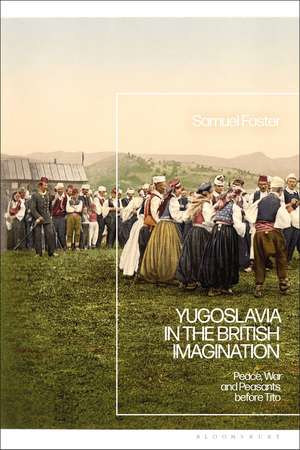Yugoslavia in the British Imagination: Peace, War and Peasants before Tito
Autor Samuel Fosteren Limba Engleză Paperback – 25 ian 2023
| Toate formatele și edițiile | Preț | Express |
|---|---|---|
| Paperback (1) | 191.48 lei 6-8 săpt. | |
| Bloomsbury Publishing – 25 ian 2023 | 191.48 lei 6-8 săpt. | |
| Hardback (1) | 471.72 lei 3-5 săpt. | +27.97 lei 4-10 zile |
| Bloomsbury Publishing – 14 iul 2021 | 471.72 lei 3-5 săpt. | +27.97 lei 4-10 zile |
Preț: 191.48 lei
Preț vechi: 249.45 lei
-23% Nou
Puncte Express: 287
Preț estimativ în valută:
36.65€ • 38.16$ • 30.97£
36.65€ • 38.16$ • 30.97£
Carte tipărită la comandă
Livrare economică 10-24 martie
Preluare comenzi: 021 569.72.76
Specificații
ISBN-13: 9781350248076
ISBN-10: 135024807X
Pagini: 242
Ilustrații: 12 bw illus
Dimensiuni: 156 x 234 x 25 mm
Greutate: 0.35 kg
Editura: Bloomsbury Publishing
Colecția Bloomsbury Academic
Locul publicării:London, United Kingdom
ISBN-10: 135024807X
Pagini: 242
Ilustrații: 12 bw illus
Dimensiuni: 156 x 234 x 25 mm
Greutate: 0.35 kg
Editura: Bloomsbury Publishing
Colecția Bloomsbury Academic
Locul publicării:London, United Kingdom
Caracteristici
Provides an original and new transnational approach to the study of British perceptions of the Balkans and of British-Balkan relations
Notă biografică
Samuel Foster is a Visiting Scholar at the University of East Anglia, UK, from where he obtained his PhD in History.
Cuprins
List of IllustrationsAcknowledgementsAbbreviationsOrthographyIntroductionPart I. The Era of the Fin de Siecle1. Themes and Contexts before the 20th Century2. Allegorising Edwardian Anxiety before 19143. Victimhood and the Changing Meaning of ArchetypesPart II. The Great War4. The British and the Balkan Front5. Peasant Martyrdom and Yugoslavia in Wartime Propaganda Part III. The Post- and Interwar Decades6. Yugoslavia in the 'Unofficial' Mind7. Towards the Next Crisis? EpilogueNotesBibliographyIndex
Recenzii
Samuel Foster's monograph should be commended for offering a fresh approach to advance the existing knowledge of British imaginative geography.
The images we have of others speak volumes about ourselves. In this book the history of the British images of the South Slav peasant become a handy tool for the telling of a wider and more intimate story: how modern Britain's ever shifting perceptions of the outside world were always, more than anything else, close reflections of Britain's own shifting self. The result is a rich, meshed history of the social and cultural lives of Britain and the Yugoslav lands from the late 19th century until the eve of the Second World War. This work is also a serious contribution to the field of imagology. Making good and critical use of the scholarship produced over the last thirty years on the modern Western images of the Balkans Samuel Foster renews and expands a field of knowledge that has still so much to give.
Detailed and compelling. I'm impressed by Foster's deft analysis of British imaginative geography and the emergence of Anglo-British identity against ethnographic and cultural rhetoric about the moral virtue of South Slavic peasants prior to and during the First World War. This is an effective way of tracking British anxieties about its place in "civilization's moral hierarchy" as Britain became an urban and industrialized nation. This transnational study expands our understanding of how depictions of foreign places and peoples in popular culture contribute to wider discursive formulations of twentieth century national identities, in this case Anglo-British identity.
The images we have of others speak volumes about ourselves. In this book the history of the British images of the South Slav peasant become a handy tool for the telling of a wider and more intimate story: how modern Britain's ever shifting perceptions of the outside world were always, more than anything else, close reflections of Britain's own shifting self. The result is a rich, meshed history of the social and cultural lives of Britain and the Yugoslav lands from the late 19th century until the eve of the Second World War. This work is also a serious contribution to the field of imagology. Making good and critical use of the scholarship produced over the last thirty years on the modern Western images of the Balkans Samuel Foster renews and expands a field of knowledge that has still so much to give.
Detailed and compelling. I'm impressed by Foster's deft analysis of British imaginative geography and the emergence of Anglo-British identity against ethnographic and cultural rhetoric about the moral virtue of South Slavic peasants prior to and during the First World War. This is an effective way of tracking British anxieties about its place in "civilization's moral hierarchy" as Britain became an urban and industrialized nation. This transnational study expands our understanding of how depictions of foreign places and peoples in popular culture contribute to wider discursive formulations of twentieth century national identities, in this case Anglo-British identity.
